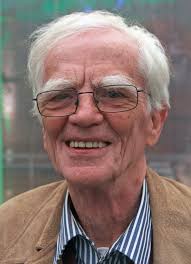Hans-Christian Ströbele was a German politician and attorney who lived from 7 June 1939 to 29 August 2022. His name is pronounced [hans kstian tbl]. He belonged to Germany’s Alliance 90/The Greens, a green political party.
Ströbele, the son of a chemist, was born in Halle (Saale). At 1959, he earned his Abitur in Marl, Westphalia. Ströbele began his military career as a reserve gunner in the early Bundeswehr at the Air Force in Aurich. [2] [3] At the Free University of Berlin and Heidelberg University, Ströbele studied political science and law. He worked as a law clerk for Horst Mahler in 1967. He began practicing law in Berlin in 1969. He participated in the student movement of the late 1960s. He joined the SPD in 1970 and was a member until 1974. He also spent eleven years as a member of the “Socialist Lawyers’ Collective,” and he gained national notoriety by representing political activists and Red Army Faction militants in court. He defended Ulrike Meinhof, Gudrun Ensslin, Andreas Baader, and Dieter Kunzelmann, members of the Kommunard party, as well as Mahler, a coworker who had enlisted in the RAF.
Ströbele was part in the establishment of the left-leaning daily newspaper taz beginning in 1977.
Ströbele was found guilty in 1983 by the Berlin District Court of aiding terrorist organizations by passing secret information between prisoners. The Court found that Ströbele had made a significant contribution to keeping the organizations active while they were imprisoned.
The “Alternative List for Democracy and Environmental Protection,” which was the forerunner of the Berlin Greens, was co-founded by Ströbele. He served in the Bundestag from March 31, 1985, to March 31, 1987. (the end of the term). He assisted in establishing the red-green alliance of 1989–1990 on the state level in Berlin.
In June 1990, Ströbele was appointed the party’s spokesperson; however, after opposing the Persian Gulf War, he resigned in February 1991. This included objecting to the party’s official tour to Israel during which Patriot missiles were to be delivered. He kept serving as a Green assemblyman in Berlin’s Tiergarten neighborhood as of 1992.
Ströbele was elected to the German Bundestag (lower house of parliament) in 1998 as a result of his placement on the Green Party’s electoral list, which was the junior partner in a government led by Gerhard Schröder. Since that time, he has served as a member of the PKGr, the parliamentary oversight body for Germany’s intelligence services. [12] Ströbele also held the position of one of the deputy chairs of the Bundestag’s Green Party parliamentary group from 2002 to 2005. Since 2005, he has also been a member of the Committee on Legal Affairs.
Early on in the Schröder administration, Ströbele began to disagree with the foreign policy positions of the Green Party’s Joschka Fischer, particularly her support for the deployment of troops to Operation Enduring Freedom and the Kosovo War (1999). (2001).
Ströbele organized a national party conference in 1999 to discuss the party’s position on Kosovo and gathered 500 signatures from party members to call for an end to NATO airstrikes against Yugoslavia. He pushed the Greens to quit the coalition government in 2001. [18]
Ströbele was not allocated a spot on the Green Party list during the pre-elections for the 2002 German federal election, which at the time was widely believed to be the only way a Green candidate could win a seat in parliament under Germany’s proportional representation electoral system. In that case, he made the decision to run for a direct mandate in the Friedrichshain-Kreuzberg Prenzlauer Berg East seat while adopting stances that markedly diverged from the Green Party’s official election campaign. As the only Green to hold a direct seat in parliament from 2002 to 2017, he unexpectedly won the direct mandate with a plurality vote of 31.6%. He obtained a second direct mandate in the 2005 federal elections, this time with a 43.2% vote majority. For the federal elections in 2009, various parties attempted to defeat Ströbele due to his local notoriety by running inventive campaigns (particularly Vera Lengsfeld’s “We have more to offer”), but Ströbele once again won the direct mandate, this time with 46.8% of the vote and again with 39.9% in 2013.
Ströbele joined Gerhard Schick, Anton Hofreiter, and Winfried Hermann in their successful 2011 constitutional complaint against the Merkel government’s failure to disclose information regarding the Deutsche Bahn and financial market oversight. The complaint was filed in 2011. The Federal Constitutional Court found that the government had in fact disregarded its obligation to respond to parliamentary inquiries and to adequately support its justifications in its verdict issued in 2017.
Ströbele declared in December 2016 that he would leave active politics by the end of the current parliamentary term rather than run in the 2017 federal elections. Canan Bayram, a candidate for Alliance 90/The Greens, defeated Ströbele in his previous electoral constituency in the 2017 election.

His Cause of Death
Ströbele, born in Halle an der Saale but raised in Marl in North Rhine-Westphalia, was a symbol of the left wing of the Greens. The son of a chemist never shied away from disputes with his own party friends – for example with the former Foreign Minister and Vice Chancellor Joschka Fischer on foreign policy issues. His recipe for success included daily advertising tours by bike and the slogan “choosing Ströbele means torturing fishermen”.
Ströbele was argumentative and critical and never held back when, in his opinion, discussions about important topics were neglected. In recent years in the Bundestag, the politician had devoted himself intensively to the subject of secret services and made headlines with a visit to US whistleblower Edward Snowden in Moscow.
When a reporter from Deutschlandfunk visited him at the end of May, Ströbele also spoke about his illness. “I have a nervous condition that causes my arm and leg muscles and also my neck muscles to atrophy, meaning they die off,” he said. He hardly ever leaves his apartment.
On Wednesday, his lawyer Johannes Eisenberg wrote in a statement: “He decided for himself that he no longer wanted to continue the long ordeal that his illness had imposed on him and that he reduced life-sustaining measures. He was fully conscious to the last. Not the spirit, the body became his torment and left him on August 29, 2022.”




Leave a Reply